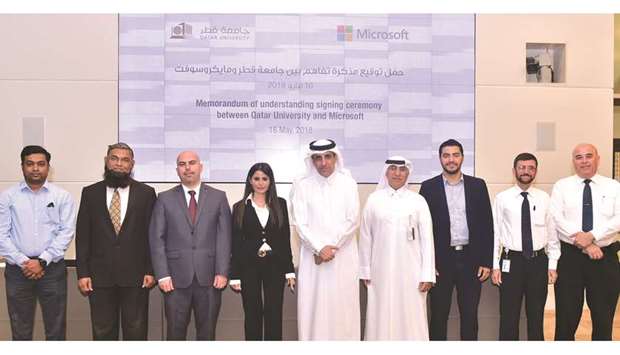Qatar University (QU) and Microsoft Qatar have signed a collaborative agreement to facilitate the efficient and effective use of information communications technology to improve teaching and learning at QU.
The agreement was signed by QU vice president for administration and financial affairs Dr Khalid al-Khater and Microsoft Qatar country manager Lana Khalaf in the presence of QU Information Technology Services Department director Dr Salem al-Naemi and officials from both institutions.
As per the agreement, QU and Microsoft Qatar will collaborate on creating a professional development platform that will serve the needs of the education stakeholders in all QU departments. This platform shall serve as the single point of resource for all pedagogy- and technology-related recorded content, as well as igniting the desire to innovate through the use of technology in the day-to-day learning exercise.
QU will promote legal use of software and will drive deployment of Office 365 for all educators and students, as well as awareness for academic pricing levels from Microsoft to institutions, educators, and students. Microsoft Qatar will provide QU with the best licensing agreement options given their unique needs, and with Office 365 access to all students and educators at no charge, as well as with Office Pro Plus benefits to all legally licensed.
In addition, Microsoft Qatar will raise awareness and adoption of available O365 services for all students and teachers with an emphasis on those that drive educational outcomes, and will provide QU with awareness and access to technology roadmaps.
Dr al-Khater said: “This agreement serves to strengthen our existing collaboration with Microsoft. It will also contribute to developing the programs and competencies at Qatar University. We look forward to achieving the goals of this agreement through our collaborative work and ongoing co-operation with Microsoft.”
Khalaf said: “Technology sits at the core of education, by empowering teachers and students to revolutionise the way we teach and learn in the digital era. The Fourth Industrial Revolution is upon us and demands new approaches to learning, from mixed-reality solutions to hands-on lesson plans, thus providing students with rich, immersive and collaborative experiences – as we prepare them for the digital future.”

QU, Microsoft Qatar officials at the signing ceremony.
